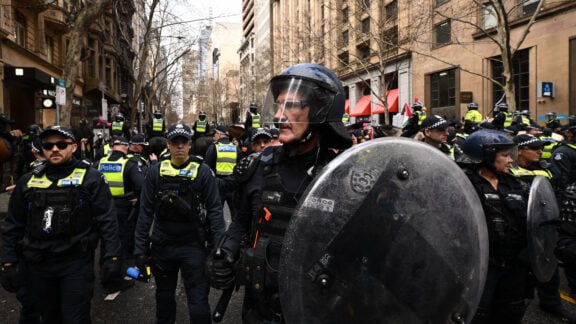Professor Spencer Zifcak, a law professor at Australian Catholic University, has strongly criticised the decision of VCAT member Noreen Megay to reject AMAC’s racial vilification claim against the Australian Macedonian [sic] Weekly (AMW) in September. Professor Zifcak’s rebuke of the VCAT ruling was published recently in The Australian.
In the original AMW article published in 2009, Greeks were referred to, among other things, as “deranged bastardly monsters”, “freaks of nature” and “hotheaded, brainwashed nationalists dwelling in the middle ages”. Professor Zifcak said in his article that Noreen Megay had been faced with the central question of whether the article was likely to incite racial hatred against Greeks or vilify them.
The professor pointed out that, “in the tribunal member’s view, the question of incitement had to be determined by reference to the audience to whom the article was addressed. If the audience was reasonably likely to be incited to hatred, revulsion, ridicule or contempt, then an actionable discrimination would have been committed.”
“The VCAT member decided that the audience should be defined narrowly. That is, the audience should be considered as the ordinary Macedonian [sic] reader of the Macedonian [sic] Weekly. She based that decision on the fact that most of the Weekly was written in the Macedonian [sic] language, although the article in question had been written in English.
“Then came a leap in logic. VCAT determined that because the readers of the Weekly would be likely to share most of the sentiments contained in the article, including its racial prejudices, they would not be stirred to hatred or contempt. Their prejudice and discrimination would already have been well entrenched. “As the member put it, for the average Macedonian [sic] reader this article was probably just “preaching to the converted”.
Consequently, the case for incitement had not been made out.” Professor Zifcak went on to describe Megay’s decision as the cause of “a counter-intuitive and undesirable consequence. Seemingly, a person may make public statements that are racially hateful and inflammatory so long as those statements are directed to others of a similarly prejudiced predisposition.
“This takes free speech a step too far,” said the professor. “In defamation law a person will be libelled no matter to whom that libel is published. The same should be true of publications that collectively vilify the people of any race. “Just as restrictions on speech can be too great, the latitude given to it can extend too widely.”
In a statement provided to Neos Kosmos, the Australian Macedonian Advisory Council (AMAC) said: “The fact that Professor Zifcak saw fit to criticise the decision in his capacity as President of Liberty Victoria, in AMAC’s view, highlights the extreme and blatant nature of the racial vilification directed towards Greeks by the Slav-Macedonian publication.”








